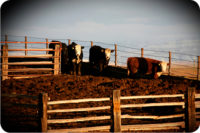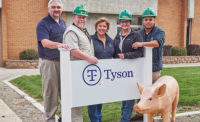Best of Both Worlds
By Tom Wray, associate editor
Meadowbrook finds its place by combining co-op advantages with corporate practices.
A long-term issue that has confronted the meat industry is differences in opinion between producers, who raise the animals for their meat, and processors, who turn the meat into products. Particularly pointed has been the issue of how much producers get paid for the livestock they raise. The easiest way to solve the problem? Have the producers become the processors.
That’s what the owners of Meadowbrook Farms in Rantoul, Ill., have done. Meadowbrook is a co-operative owned by the farmers who raise the hogs used for the co-op’s products.
James Burke, the president and CEO of the Meadowbrook Farms Cooperative, said that the majority of the members are in Illinois, with a few additional farmers in neighboring Wisconsin and Indiana.
Historically, disagreements about the price of hogs have been the source of greatest angst between processors and producers. These very issues, centered on the price of hogs, were the reason that some farmers in central Illinois organized the co-op.
“Prices below the on-farm cost of production were the core motivator for producers to form Meadowbrook Farms Cooperative,” said Burke. “The initial planning for the co-op strongly advised us to build the plant with the capabilities to meet future customer needs rather than simply being a slaughter house competing for each day’s kill.”
It wasn’t easy getting to this point. Since Meadowbrook isn’t a traditional corporation, it must work harder to get any capital. Burke explains that the organizers had to modify plans for the plant itself to fit within the budget they had — “like farmers do on-farm,” he says. The plant itself began work on its first day and was designed to be modified and improved as the co-op grew. Since its beginning, the co-op has added equipment, adopted new techniques and changed how the space at the plant is used.
Reaping rewards
So far, the plans the co-op has made have paid off. The ability to track pork back to the farm it was raised on has proven important as traceability has become important in the industry. The on-farm and in-plant capabilities of the plant and member farmers have let them adapt to the growing demand of natural pork and pork without antibiotics. The co-op also has been able to partner with foreign buyers to serve both the foreign and domestic markets, Burke says.
Being a co-operative, where the owners of the company are the same people who are raising the pork it processes, has challenges that wouldn’t face a traditional corporation with stockholders and a board of directors. The business must meet everyone’s expectations.
“Being an owner of a co-op seems to be more meaningful than owning a stock certificate from a corporation,” explains Burke. “Ownership in a co-op seems to be more real, especially if you visit the co-op facility on a regular basis.”
He goes on to say that there is an emotional impact as members come up to the loading dock and see the impact of individual investments with the co-op and with the members’ own families.
Seizing opportunity
But while Meadowbrook may be small compared to the big corporations, it’s big compared to other co-ops. The one percent piece of U.S. pork production that Meadowbrook has is tiny compared to the production of the big corporations in the industry. However, compared to other co-ops, Meadowbrook is one of the big boys.
“We’re big enough to deliver on commitments, yet small enough to develop a real partnership with our customers,” Burke says.
Another difference from most co-ops is how the members set it up,he continues. Meadowbrook takes advantage of the financial and organizational advantages of a co-op, but also use modern successful business practices. The members are proud of their farmer-owned status, but they realize that it will succeed by combining the best of what they do every day on the farm with the efficiencies of modern American corporations.
The advantages are financial. As a farmer-owned co-op, the status allowed Meadowbrook to tap into federal rural development funds. Burke says that allowed the co-op to develop a refined business plan. And the fact that it is owned by the farmers themselves, who all attend the meetings, allows everyone involved to be kept fully up-to-date at member meetings.
But unlike most co-ops, Meadowbrook’s employees report to a CEO, like in a shareholder corporation. Using a corporate structure and recruiting meat industry professionals allows the organization to use progressive business tools and adapt quickly to a changing market. Meanwhile, the co-op ownership allows them to keep the long-term goals in mind. The result is an organization that can use its tools, such as its computer system, to meet customer requirements while using the co-op structure to be able to tell customers how, when and where pork was raised.
“We believe we need to seize the opportunities of today and tomorrow, and this sometimes requires us to break from past expectations and practices,” Burke says.
Meadowbrook uses a combination of in-house sales and brokers to reach customers. The co-op’s products cover the whole range of items you would expect from pork. Burke goes on to say that members are very proud of some new products that are being introduced into select markets. They have launched a line of multi-cuisine pork roasts with styles such as adobo, mojo, chipotle and chimichurri marinades. Each one carries a bilingual label. The company also has cuts such as Milanese and French pork chops.
“We just installed equipment that is getting us into some new areas such as Bourbon Peppercorn Sausage, Tomato Basil and Cheese Sausage and Roasted Red Pepper & Garlic marinated chops,” Burke says.
The co-op’s plant location also helps. Rantoul, close major population centers, has easy access to several major transportation routes, including interstates 57, 70, 80 and 55. Each of the highways links to major cities, including Chicago only 100 miles to the north.
With success, there has been some growth in the number of members. Burke explains that, although the co-op has seen some shares change hands, members and officers don’t expect to see a lot of new interest until the currently volatile hog cycle goes back to more normal ups and downs. He says Meadowbrook looks best when live hog prices are substantially below the average cutout value. In the meantime, Burke says, Meadowbrook is making strong relationships in the meat industry.
“A recent example is the partnership Meadowbrook formed with Nature’s Premium LLC, a division of the Triad Foods Group. Nature’s Premium will be a national brand of all-natural pork,” he explains.
Meadowbrook will process the pork to meet consumer requirements for products from animals raised on family farms that do not use pesticides in contact with the hogs, which are also antibiotic-free, free of growth promotants and raised on a vegetarian diet.
Agreements such as these bring the co-op that much closer to its ultimate goal. Burke says Meadowbrook will remain focused on its core strength — raising 100 percent natural pork through a certification program that guides the decisions for all of the member farmers.
“We have not yet fully realized our goal of being the best supplier of chilled pork exports and the nation’s No. 1 supplier of natural and antibiotic-free pork products, but we are making real progress towards those goals,” Burke says.
Meadowbrook Farms Cooperative
Founded in 2004
Headquarters: Rantoul, Ill.
Employees: 500
Plants: 1
Headquarters: Rantoul, Ill.
Employees: 500
Plants: 1



Report Abusive Comment